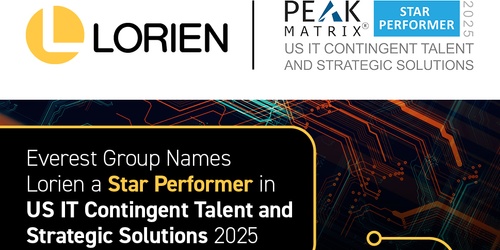AI is no longer a back-office experiment. At Cincy AI Week 2025, one message came through loud and clear: AI is shaping how entire organizations function—and who they need to hire next. Whether you're building internal data teams or driving digital transformation, the conversation is no longer if AI will impact your workforce. It’s how fast you can adapt.
As workforce solution experts, our Lorien team attended this annual event to track emerging trends and translate them into what matters most for hiring managers: what roles are rising, which skills are in demand, and where teams need to evolve.
Here are the three biggest takeaways from the event and what they mean for your hiring strategy.
1. AI Is Moving from Projects to Infrastructure—And So Is Hiring Demand
Sessions like "Building an Intelligent Region" spotlighted how cities and companies are embedding AI into core systems from transportation and infrastructure to financial services and customer operations.
This shift isn’t experimental. It’s structural. AI is now woven into business continuity, requiring full-time, high-impact roles that didn’t exist five years ago.
Hiring Impact:
AI is moving from pilot work to foundational infrastructure and that means demand is surging for critical roles:
-
AI Implementation Leads
-
Enterprise Data Architects
-
Systems Integration Engineers
By the Numbers:
-
Demand for AI and machine learning roles has grown 246% since 2020 (Lightcast, 2024)
-
Nearly 75% of U.S. companies say they struggle to find AI-skilled talent (IBM, 2023)
At Lorien, we’re helping clients hire cross-functional teams that understand both legacy systems and AI modernization paths essential for any org preparing to scale.
2. Intelligent Teams Require More Than Just Technical Skill
In sessions like “Building Intelligent Teams and Organizations” and the Women in AI & Tech Breakfast, speakers emphasized a consistent message: you can’t build an AI-powered business without an AI-aware workforce.
Diverse teams, blended skill sets, and AI literacy across functions (not just engineering) are critical to transformation success.
Hiring Impact:
New hybrid roles are emerging that combine domain knowledge with AI fluency:
-
AI Adoption Consultants
-
Change Management Leads
-
AI Governance & Ethics Specialists
By the Numbers:
-
Only 25% of enterprises say their current workforce is ready for AI transformation (McKinsey, 2024)
-
94% of business leaders expect employees to pick up new skills on the job—up from 65% in 2018 (WEF, 2023)
We’re working with hiring managers to rethink job design and attract adaptable talent who can evolve as fast as the technology itself.
3. Automation & AI Agents Are Changing Workflow and Headcount Strategy
The closing sessions on "AI Agents, Systems & Workflows" pointed to where enterprise automation is heading. These tools aren’t replacing people, they’re redefining what people are hired to do.
The focus is shifting from repetitive tasks to higher-value decision-making, collaboration, and system oversight.
Hiring Impact:
As automation becomes more embedded, demand is growing for:
-
Prompt Engineers
-
AI Workflow Analysts
-
Low-code/No-code Solution Architects
By the Numbers:
-
The World Economic Forum estimates 97 million new roles may emerge by 2025 due to AI and automation
We’re seeing clients realign job scopes and team structures, often using contingent consultants, to meet shifting business needs while avoiding lengthy hiring cycles.
The Bottom Line for Hiring Managers
AI is transforming business models and with it, the definition of a competitive team.
From new roles to reimagined responsibilities, Cincy AI Week reinforced what we see every day in the field:
-
Time-to-hire matters more than ever. 66% of tech candidates expect hiring to wrap in 4 weeks or less (Lorien’s 2025 What Tech Candidates Want Report).
-
Generalists can’t carry emerging workflows alone.
-
Internal teams are stretched and outside help is often needed to scale specialized hiring fast.
What’s Next?
At Lorien, we’re not just watching these trends: we’re building the teams that help companies lead them.
Whether you're filling a niche AI role, launching a new initiative, or simply not getting the right applicants through your funnel, we can help.
Let’s talk about how your workforce can evolve alongside your AI strategy.








